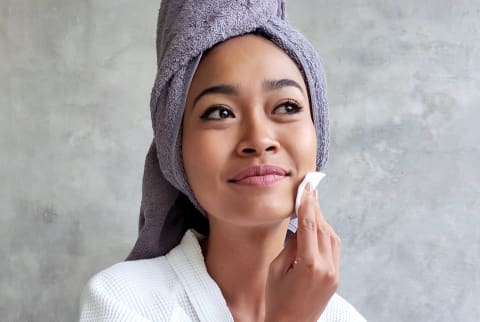This is why it’s so important to get personal with your own skin. “We can get into the nitty-gritty details of ingredients all we want, but that doesn’t mean anything if you don’t know how to use it in your own routine. That’s why I think it’s so important to learn how to implement, improve, and troubleshoot your own skin care routine for your skin type,” Fu continues. And Lu agrees: “It’s empowering for someone to be comfortable enough with their skin that you know what it needs every day.” “It used to be that the consumer wasn’t thinking about percentages or ‘Oh is this ingredient at an efficacious concentration?’” says Lu, noting this meant brands could get away with barely dusting actives in the formulas. “But now it’s gone too far in the other direction. The train has derailed so fast and so hard! Now we’re telling customers, ‘No, hold on—you don’t need that high of a percentage!’” And this is especially true of ingredients that could potentially cause irritation: “There is no reason you need to be putting 4% retinol on your face every night. There is no reason you should be looking for 30% glycolic acid for everyday use,” says Fu. And one such claim that isn’t regulated is “oil-free,” notes Fu. “I definitely have issues with the oil-free claim. In a lot of cases I think it’s not helpful to the consumer because it’s not a regulated claim and this means that per brand, it could mean anything,” she says. You would think that there would be only one way to define such a claim (you know, the formula is devoid of oils). But as Fu explains, that’s not the case. Oil-free could include several different parameters: “It could mean just silicone emulsions, it could mean that the ingredient list simply doesn’t have the word ‘oil’ in it; there are a lot of ways to define that,” she says. “Plus there are good oils that can be really beneficial for oily skin, so I think that term just leads people further astray.” However, which preservatives are used (and how much) can vary depending on several unique factors. “Final packaging, how the consumer will interact with the product, formula type, and water content all matter when looking at preservative systems,” says Lu. “It’s not like there’s a set dose of preservatives that work for everything. That’s why it’s so important for brands to do the proper tests—because at the end of the day, cosmetics aren’t regulated in this sense and can launch without doing this.” Rest assured that most brands (especially the major ones who may face a lawsuit) already do this. However, if you have concerns, check in with the brand—some have even started detailing which tests they do and what their preservation systems are.



